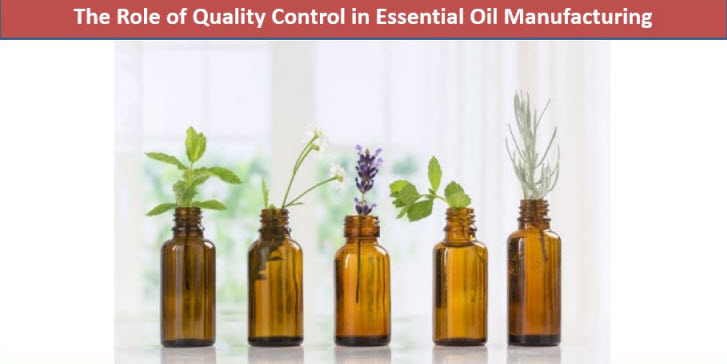Blogs

The Role of Quality Control in Essential Oil Manufacturing
Quality control is a pivotal aspect of essential oil manufacturing that ensures the production of safe, pure, and effective products. Essential oils, highly concentrated plant extracts, are utilized in various applications, including aromatherapy, cosmetics, and wellness products. To maintain their therapeutic properties and safety, stringent quality control measures are essential throughout the manufacturing process. In this article, we will explore the vital role of quality control in essential oil production and its significance in delivering high-quality products to consumers.
Understanding Essential Oils
Essential oils are volatile compounds extracted from aromatic plants through methods such as steam distillation, cold pressing, or solvent extraction. These oils contain the characteristic fragrance and therapeutic properties of the plant from which they are derived. Due to their potency, essential oils must undergo rigorous quality control to ensure their purity and safety.
The Importance of Quality Control
Quality control in essential oil manufacturing is a comprehensive process that encompasses various stages, from sourcing raw materials to the final product. Here's why it's crucial:
Ensuring Purity
Quality control verifies that essential oils are free from contaminants, adulterants, or diluents. This is critical as any impurities can compromise the oil's effectiveness and safety.
Confirming Authenticity
Essential oils are often targeted by counterfeiters due to their high value. Quality control measures include tests to confirm the authenticity of oils, ensuring consumers get what they pay for.
Assessing Chemical Composition
Each essential oil has a unique chemical profile that determines its therapeutic properties. Quality control ensures that the oil's chemical composition is consistent with established standards.
Verifying Safety
Safety is paramount in essential oil use. Quality control identifies potential allergens and contaminants, helping to prevent adverse reactions in users.

Quality Control in Essential Oil Manufacturing
The process of quality control in essential oil manufacturing can be broken down into several key steps:
Raw Material Selection
Quality begins with sourcing the right raw materials. Plants must be grown in optimal conditions without exposure to pesticides or pollutants.
Extraction Methods
The method of oil extraction greatly impacts its quality. Manufacturers must choose appropriate techniques and equipment to preserve the oil's integrity.
Laboratory Testing
Essential oil samples undergo extensive laboratory testing, including gas chromatography and mass spectrometry, to analyze their chemical composition. This ensures that the oil contains the expected constituents and is free from impurities.
Quality Assurance
Manufacturers establish stringent quality assurance protocols to maintain consistency and safety. This includes batch testing, documentation, and adherence to industry standards.
Packaging and Storage
Proper packaging and storage are crucial to prevent contamination and degradation of essential oils. Quality control extends to these stages to maintain product integrity.
Regulatory Compliance
Essential oil manufacturers must adhere to regulatory guidelines and standards set by organizations such as the International Organization for Standardization (ISO) and Good Manufacturing Practices (GMP). Compliance ensures that products meet specific quality and safety criteria.
Conclusion
Quality control is the backbone of essential oil manufacturing. It guarantees the purity, authenticity, and safety of these highly concentrated plant extracts. Consumers rely on quality control measures to ensure that the essential oils they purchase deliver the expected therapeutic benefits without adverse effects. As the demand for essential oils continues to grow, manufacturers must remain committed to upholding rigorous quality control standards, ultimately contributing to the well-being of consumers worldwide.

